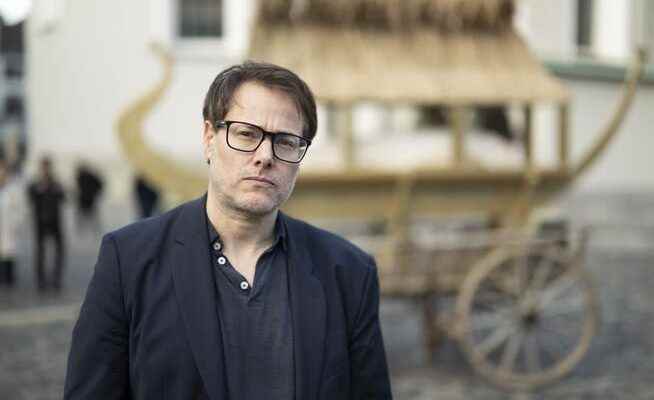The theater director escalates one stage after the other around the mummy in the Abbey Library. Now Egypt has also gotten involved.
The Swiss theater maker Milo Rau poses during an action to return the mummy Schepenese, pictured on Thursday, November 17, 2022, in St. Gallen. Today, Milo Rau received the St. Gallen Culture Prize, which is endowed with CHF 30,000. He donates this money to bring the mummy, which is on display in the monastery library, back to Egypt. (KEYSTONE/Gian Ehrenzeller)
Milo Rau makes theatre. This is not surprising: the man is a director. With his current production, he achieves everything that helps a good piece to be successful: it moves people, stirs up emotions and divides opinions.
At least in eastern Switzerland, the play “Let Schepenese return home” is a kind of pre-Christmas spectacle, even a scandal in which the church, politics and other countries are now also involved. Based on the beliefs of the ancient Egyptians, driven by the guilty conscience of the modern west, Rau keeps the story escalating. A historical drama with a contemporary reference.
The St. Gallen Declaration
Rau’s production is peppered with a number of trials and tribulations. It begins in St. Gallen, which is decorated for Christmas. In the monastery library lies the mummy of the Egyptian priest’s daughter Shepenese, in a glass coffin and unwrapped over her shoulders. Every day visitors come to admire the ancient remains. Every evening, employees of the Abbey Library cover the glass coffin with a blanket and the words “Good night, Schepenese”.
The theater director Rau now wants to change this situation. In order to set an example in dealing with colonial art and to make Schepenese’s journey home possible, Rau opened the St. Gallen Declaration to the public with flyers, a ritual and a cart parade. She demands that the mummy be treated with more respect and, above all, that it be returned to Egypt.
The Catholic denomination part of St. Gallen, which owns the mummy, and the Abbey Library, whose crowd puller it is, do not like the explanation. Abbey librarian Cornel Dora countered Rau’s statement with the fact that no official demand for the mummy had been made from Egypt. However, this is necessary in order to return cultural assets from other countries. That was the end of it for Dora.
The interpellation to the city parliament
When interest in Schepenese’s whereabouts leveled off, Rau initiated the next level of escalation: SP politician Peter Olibet and 18 co-signers submitted an interpellation to the St. Gallen city parliament. One question is: “What steps is the city considering to get the authorities of the Catholic denomination to change the current exhibition practice?”
The reaction from the Abbey Library was not long in coming. “Neither the Egyptian state nor the group around Milo Rau have formulated any concerns about the Catholic denomination,” Raphael Kühne, President of the Administrative Council of the Catholic denomination, was quoted as saying in a hastily sent media release. Dora added: “Mummies are exhibited in many places around the world, but the presentation is often less dignified than in the Baroque Hall of the St. Gallen Abbey Library.” Now, as one may have thought at Klosterplatz, the story is really over.
The open letter from Egypt
But the outstanding demand from Egypt was the cue for the next step in Rau’s dramaturgy. In an open letter, in which Schepenese is sometimes also called Shepen-Isis or Schepen-Isis, more than 200 Egyptians from science, tourism and culture are demanding the return of the mummy and sarcophagus: “We are in the process of collecting the necessary documents for the Egyptian prepare the Ministry of Foreign Affairs to make the official application for restitution,” it says.
The entire production is paid for by the St. Gallen Cultural Foundation. However, not entirely voluntarily: she had awarded Rau her culture prize. The prize money is 30,000 francs, with which Schepenese’s repatriation – and Rau’s associated self-portrayal – should be shelled out. The fact that Rau snubs those who have praised him with his win may have less to do with St. Gallen and foreign cultural assets and more to do with Rau’s very personal story.
It is the second attempt for a prize from the east: Rau should have received a St. Gallen culture prize in 2018. The city’s cultural commission had recommended him for it – but the city council had prevented the award. Now the city council has to take care of an interpellation – and possibly put up with the departure of its oldest citizen.
